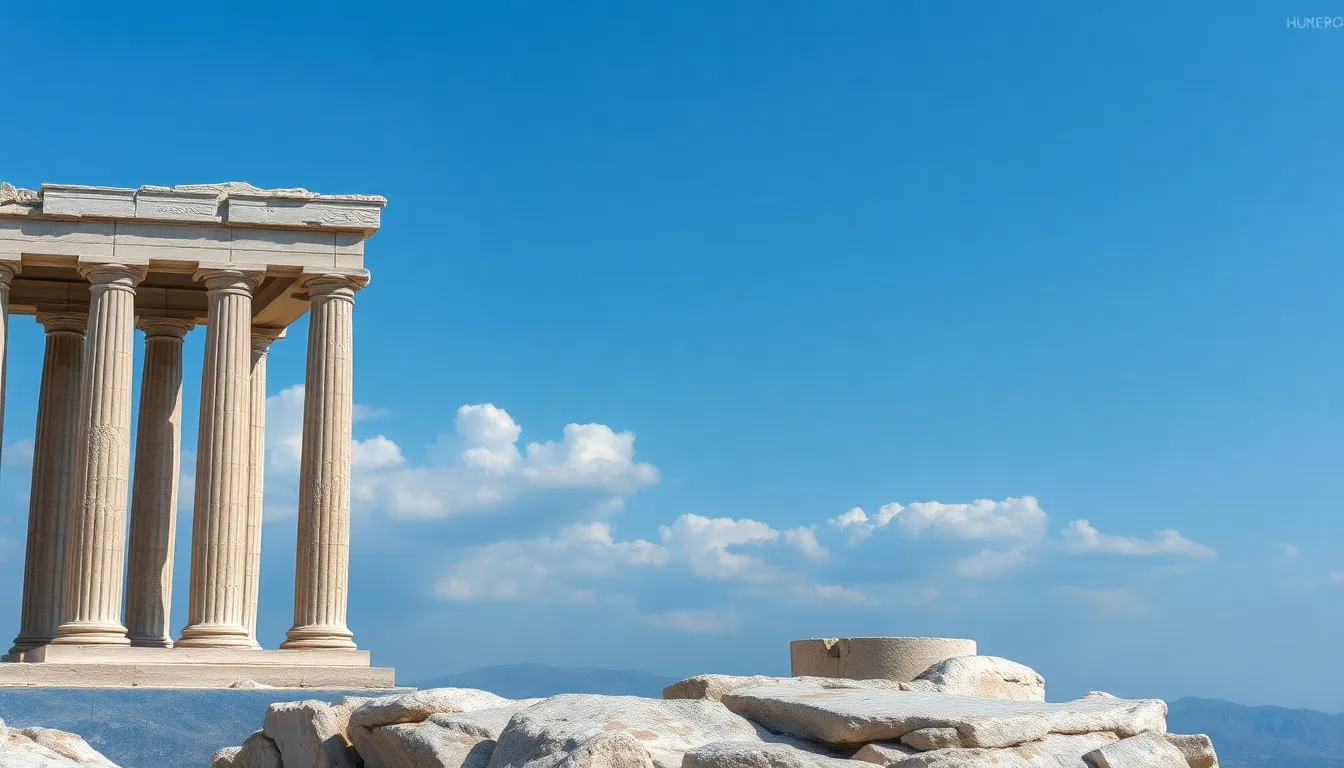The Significance of Uranus in Ancient Greek Religion
I. Introduction
Ancient Greek religion was a rich tapestry of beliefs, rituals, and mythologies that revolved around a pantheon of gods and goddesses. Among these deities, the primordial entities held a special place, representing essential aspects of the cosmos. One such primordial deity is Uranus, the personification of the sky. This article aims to explore the significance of Uranus in ancient Greek religion, examining his origins, symbolism, and enduring legacy.
II. The Mythological Origins of Uranus
Uranus is a primordial deity whose birth is steeped in the mythological traditions of ancient Greece. According to Hesiod’s “Theogony,” Uranus emerged from Chaos, the void that existed before the creation of the universe.
- Birth and Genealogy: Uranus is often described as the first being to exist, representing the sky itself. He is the son of Chaos and the father of the Titans, the Cyclopes, and the Hecatoncheires.
- Relationship with Gaia: Uranus’s most significant relationship is with Gaia, the Earth. Together, they produced numerous offspring, including the Titans, who played a central role in Greek mythology.
- Role in the Creation Myth of the Titans: The union of Uranus and Gaia is crucial in the creation myth, as their children would later become the Titans, who would overthrow their father in a monumental struggle for power.
III. Uranus as a Symbol of the Sky
The sky held immense significance in ancient cosmology, representing not only the physical realm above but also the divine and the eternal. Uranus, as the embodiment of the sky, symbolizes various heavenly phenomena.
- The Significance of the Sky: In ancient Greek thought, the sky was associated with the gods, celestial events, and the cosmos, reflecting the order and harmony of the universe.
- Representation of Heavenly Phenomena: Uranus is often linked to stars, planets, and other celestial bodies, embodying the vastness and mystery of the universe.
- Uranus’s Association with Divinity: As a primordial deity, Uranus represents the divine aspect of the cosmos, transcending the more anthropomorphic gods and goddesses of the later pantheon.
IV. Uranus in Greek Cosmogony
Uranus plays a pivotal role in Greek cosmogony, the study of the origins and structure of the universe. His interactions with other primordial beings shaped the narrative of creation and the eventual emergence of order from chaos.
- Uranus’s Role in the Creation of the Universe: Together with Gaia, Uranus helped form the world, giving birth to various entities that would populate the cosmos.
- Interaction with Other Primordial Beings: Uranus’s relationships with entities such as Chaos and Tartarus illustrate the interconnectedness of primordial deities within the cosmological framework.
- Influence on the Narrative of Chaos and Order: The struggle between Uranus and his children marks a significant transition from the chaotic beginnings of the universe to the structured pantheon of gods.
V. Mythological Stories Involving Uranus
Uranus is central to several crucial myths in Greek mythology, particularly concerning his overthrow by his children. These stories reflect themes of power, rebellion, and the cyclical nature of myth.
- The Titanomachy and the Overthrow of Uranus: Uranus was overthrown by his son Cronus, who castrated him, leading to Uranus’s separation from Gaia. This act symbolizes the inevitable conflict between generations.
- Key Myths Involving Uranus, Gaia, and the Titans: The myths surrounding the birth of the Titans and their eventual rebellion against Uranus and Cronus are foundational tales that explain the origin of divine hierarchy.
- Interpretations of These Myths in Ancient Texts: Ancient poets like Hesiod and later writers interpreted these myths as allegories for natural phenomena, political power struggles, and the human condition.
VI. Worship and Cultural Significance of Uranus
While Uranus did not receive widespread cult worship compared to other deities, evidence of reverence for him can still be found in ancient texts and artistic representations.
- Evidence of Worship Practices Related to Uranus: Some scholars suggest that early agricultural societies may have performed rituals to honor Uranus as a sky god, linking him to fertility and the harvest.
- Artistic Representations and Symbolism in Ancient Art: Uranus is depicted in various ancient artworks, often symbolizing the sky with starry motifs or as a celestial figure.
- Role in Rituals and Festivals: Although specific festivals dedicated to Uranus are not well-documented, his influence is seen in celebrations related to the natural world and celestial events.
VII. The Legacy of Uranus in Later Greek Thought
Uranus’s significance extended beyond ancient myth, influencing later philosophical and metaphysical thought in both Hellenistic and Roman contexts.
- Influence on Philosophy and Metaphysics: Philosophers such as Plato and later Stoics incorporated the concept of a primordial sky into their cosmological frameworks, reflecting on the nature of existence and the cosmos.
- Uranus’s Representation in Hellenistic and Roman Contexts: In Roman culture, Uranus was often equated with Caelus, the god of the sky, continuing the tradition of sky worship.
- Impact on Subsequent Mythological Narratives: Uranus’s stories contributed to the development of later myths and legends, influencing the portrayal of gods and the structure of mythological narratives.
VIII. Conclusion
Uranus holds a significant place in ancient Greek religion as a primordial deity representing the sky and the cosmos. His origins, relationships, and myths reflect the complexities of Greek cosmogony and the transition from chaos to order. The legacy of Uranus extends into later philosophical and artistic realms, demonstrating the enduring impact of primordial deities in shaping cultural memory. As we reflect on the importance of these ancient narratives, we can appreciate how they continue to resonate in modern interpretations of mythology and the human experience.




